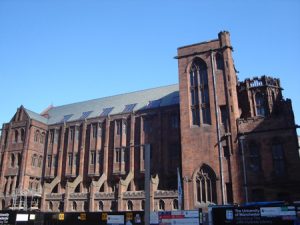


John Rylands Library at The University of Manchester
The University of Manchester is Britain’s first chartered university of the 21st Century and is the largest single-site higher education institution in the UK. In order to deliver superior IT services and support for its 35,000 students, the University has embarked on a £630 million plan to deliver eight new buildings and a number of major refurbishment projects by 2010. Included in this development is a £16.8 million programme to enhance the John Rylands Library – a magnificent neo-Gothic building located in the heart of Manchester. The library houses one of the most spectacular collections of rare books and manuscripts including the St John Fragment (dating from 125AD).
The library refurbishment aims to improve facilities for students and a new wing is also being added which will contain 10km of shelving in a temperature controlled environment to ensure that the priceless artefacts are protected. Anthony Jones, IT Coordinator at The University of Manchester explains; “The library is undergoing a multi-million pound refurbishment and extension project to improve visitor access and customer services. A new cabling system will also be required to improve internet access to records and indexes held here.”
The Molex Solution
There were a number of criteria to consider when selecting the Structured Cabling System Provider. Due to the historical nature of the site, there would only be one opportunity to lay a cabling network as this extent of upheaval to the library is unlikely to occur again in the foreseeable future. A high quality cabling infrastructure that could offer a long-term solution was therefore an essential requisite, and given that Molex offers 25 Year System Application Warranties with all their systems and had already made a positive impression with other installations in the university campus, Molex’s PowerCat™ Category 5e system was preferred and therefore selected for this project.
The PowerCat system also offers a flexible solution that can accommodate unusual business environments such as found at the John Rylands Library. Project Manager Darren Stephens of INS Sudlows – the installation partner – highlights; “As both an icon of Manchester’s heritage and a vital part of the University’s learning resource, it was imperative that the cabling system installed was of a high specification and that the physical component parts had a discrete aesthetic and quality finish. Molex was the only solution, when considering this delicate balance of modern data requirements and Grade listed status.”
Details of the Installation
As John Ryland Library is a Grade One listed building, the installation required detailed planning and regular consultation with specialist contractors. Every aspect of the cabling installation had to be precisely coordinated with the various restorers and craftsmen who were working throughout the building. Careful attention had to be paid to precisely plan the cabling runs as any misplaced drilling and installation techniques could, potentially, destroy the rare and valuable original fittings.
Stephens emphasises the main challenges they had to overcome working in this genre of building; “Since Data cabling was, for obvious reasons, not conceived in the architecture of the original Victorian Modern Gothic design programme of the 1890’s, it was clear from the outset that this project was always going to produce many technical challenges. Infrastructure routing posed the greatest challenge and in many cases unique installation practices were employed to install the cabling system.” For example, INS had to find ways of working with and around the existing architecture such as carefully lifting the Parquet floor blocks and chiselling notches to their underside where the cables would run in order to discretely lay the cables under the floor.
With system benefits of performance delivery and cable flexibility, Category 5e was the clear option for this environment. This was due, in part, to its ability to bend around a number of irregular corners and turns without affecting data performance. In addition to the existing Communications Cabinet located in the library basement, another cabinet was installed in the new extension to cater for the additional user access points that would be required. Careful selection of component parts was undertaken to minimise the impact both visually and from an engineering point of view. Even the outlet face plates had to be hand selected to blend in with the colour of the oak panelling used throughout the building.
The Molex Partnership
INS Sudlows have been installing Molex cabling systems for over 15 years and hold the status of Molex Certified Installer. Both companies have history with the university campus supplying and installing network cabling solutions and have therefore collected a wealth of knowledge and expertise over the years regarding the client’s requirements. Anthony Jones, IT Coordinator at the University of Manchester comments; “Molex and INS Sudlows have a proven track record at The University of Manchester dating back to the early 1990s. Only a cabling system we know will meet all our expectations and installed to the highest standard could be considered for a project of this nature.”
Conclusion
Installing Molex’s PowerCat solution at the John Rylands library was a highly challenging yet interesting project. The cabling implementation was carried out in phases as the installation team had to work around other site builders and developers and therefore took around 3 months to complete from start to finish. The Molex/INS partnership ensured that the correct systems and materials were selected for the job, the customer’s requirements were met and the installation itself was carried out efficiently and to specification. Molex already has a sound reputation at the University for its robust and reliable products, which are also currently being installed in other new build and refurbishment projects throughout the campus as part of the University of Manchester’s commitment to improving IT services for its students.